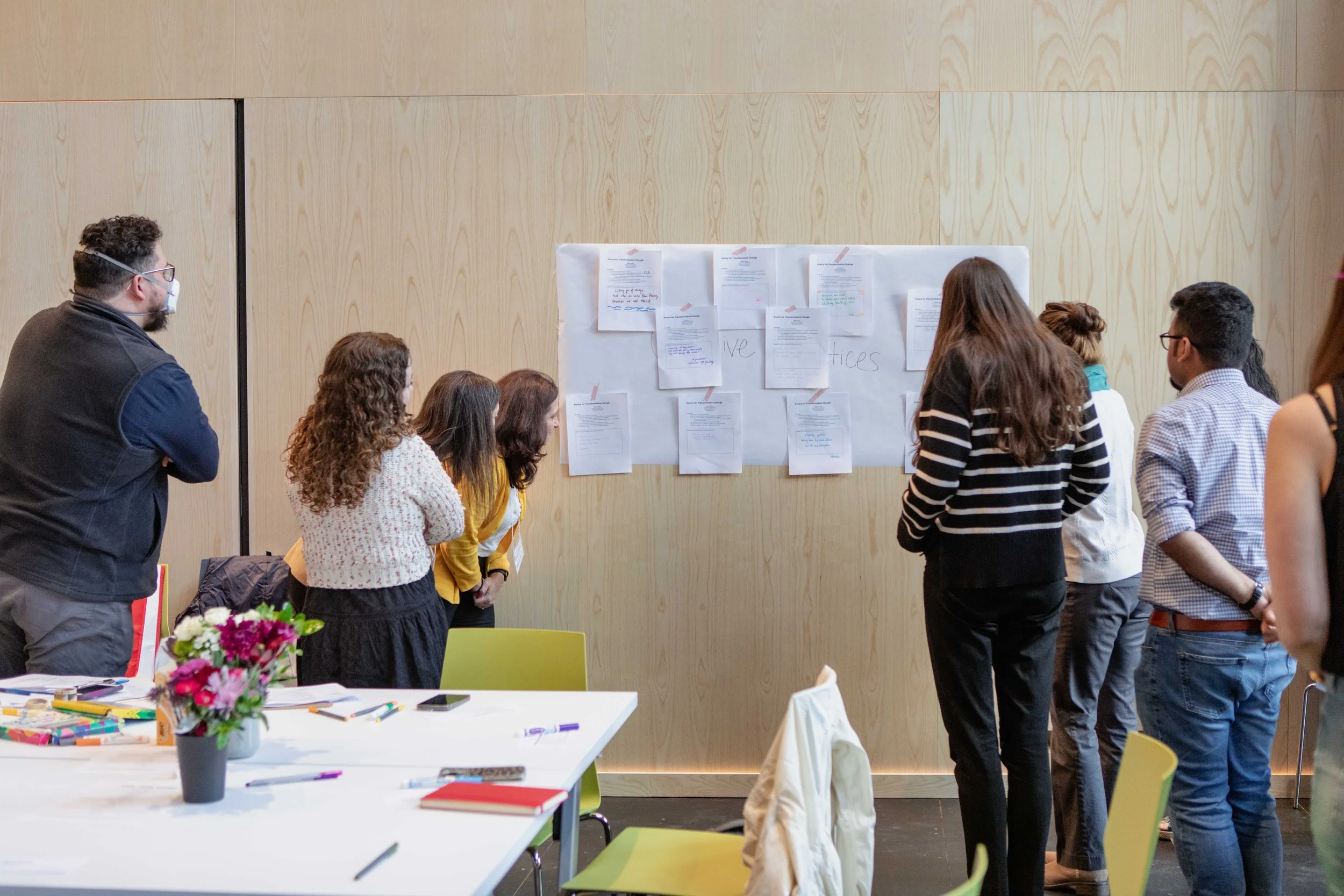
Data+Soul Workshops
Data+Soul Research offers tailored workshops to support nonprofits and their funders in evaluation and data storytelling. Below is our current workshop menu. We are also happy to develop workshops custom tailored to your training needs.
Evaluation Planning + Design
Our Evaluation Planning + Design workshops help clients articulate and document their theories of change or evaluation plans, ensuring that their plans are realistic for their existing capacity and needs.
The Story+Data Map: A person-centered tool for articulating a theory of change
Duration: 90 minutes
Format: Webinar
-
The Story+Data Map is a person-centered, assets-based tool that can be used to articulate a program logic model or theory of change. The purpose of this workshop is to introduce participants to the Story+Data Map and demonstrate how to use it to create a logic model. This workshop will include the opportunity for participants to apply the Story+Data Map to their own projects.
-
By the end of this workshop, participants will have:
Increased sense of connection to others working in similar spaces/topic areas
Increased understanding of the key components of a logic model
Increased clarity of their own organization’s/project’s theory of change and tools to transform that into a logic model
Equity-centered approaches to evaluation planning and data collection
Duration: 180 minutes
Format: In-person workshop
-
The purpose of the workshop is to train and empower participants with evaluation approaches and mixed methods data collection techniques they can use in their project work and evaluations. Using a combination of individual reflection, group discussion, and case studies, participants will have an opportunity to explore equity-centered evaluation tools (e.g., Data Equity Deck, Water of Systems Change) and apply those tools to their work.
-
By the end of this workshop, participants will demonstrate:
Increased awareness the different ways evaluative thinking and specific tools can help them answer their questions
Increased confidence and ability to collect feedback on their projects and shape their evaluation questions
Increased enthusiasm the ways in which data can support their day-to-day work
Data Collection + Analysis
Our Data Collection + Analysis workshops help clients build the foundational skills they need to collect meaningful data and analyze data with low-cost tools.
The Mixed Methods Data Collection Toolbox
Duration: 90 minutes
Format: Webinar
-
The purpose of this workshop is to inspire participants to move beyond outputs and include outcomes in their evaluation efforts, while equipping them with creative and right-sized tools to gather outcome data. In this workshop, participants will explore a variety of both quantitative and qualitative data collection methods, with special emphasis on creative, highly engaging and participatory methods that can work well with different audiences. In breakout groups, participants will apply what they have learned and select mixed-methods tools that work well for them.
-
By the end of this workshop, participants will demonstrate:
Increased understanding of why it’s important and valuable to measure outcomes
Increased ability to articulate a SMART (Specific, Measurable, Attainable, Relevant, Timely) outcome
Increased confidence in identifying, adapting, and/or creating relevant data collection approaches to measure their outcomes
Quantitative and Qualitative Analysis Using Pivot Tables
Duration: 120 minutes
Format: Webinar or in-person workshop
-
The purpose of this workshop is to provide participants with a hands-on opportunity to build skills and confidence in using Google Sheets (or Excel) to analyze their own quantitative and qualitative survey data.
-
By the end of this workshop, participants will demonstrate:
Increased knowledge of Pivot Table features for data analysis
Increased comfort analyzing data using Pivot Tables
Increased ability to answer their analysis questions and identify future questions for analysis
Qualitative Data Analysis
Duration: 90-120 minutes
Format: Webinar on in-person workshop
-
The purpose of this workshop is to help participants strengthen their qualitative analysis skills by putting qualitative analysis into practice. In this highly interactive workshop, participants will get hands-on experience with key aspects of the qualitative analysis process:
Reading qualitative data
Coding qualitative data
Analyzing and interpreting qualitative data.
-
By the end of this workshop, participants will demonstrate:
Increased awareness of the ways in which they're already collecting qualitative data, whether formally or informally
Increased confidence in applying the basic steps of a qualitative analysis process
Data Storytelling + Dissemination
Our Data Storytelling + Dissemination workshops help clients tell compelling stories of impact grounded in evidence or data.
How do we share the impact of our work? Using reflection and storytelling tools to advance systems change (Part 1)
Duration: 60 minutes
Format: Webinar
-
Intentional reflection and storytelling can help changemakers make strategic decisions and measure and communicate results, but they are especially difficult to take on when the work is to effect change in complex, deep-rooted systems. Changemakers might ask: Where do we begin? How can we do this with limited resources? How do we prioritize these efforts within a broader change effort? During this session, we will facilitate an interactive discussion that supports participants to a) identify a set of reflection questions that can help them mobilize political and financial support to continue having an impact into the future, and b) begin to prioritize these questions so as to pave the way for compelling storytelling. Participants will consider: Who do we want to feel invested in this work and why (key audience)? What do they want to know about our program (storytelling goal)? What resources and opportunities do we currently have to collect and share this information (storytelling assets)?
-
By the end of this workshop, participants will:
understand how to use reflection and storytelling to strengthen the impact and sustainability of their work
identify a set of reflection and storytelling planning activities that can be leveraged to strengthen the impact and sustainability of their work
How do we share the impact of our work? Implementing your reflection and storytelling plan (Part 2)
Duration: 120 minutes
Format: In-person workshop
-
During this session, we will re-cap Part 1 and share a process for selecting, prioritizing, and implementing a storytelling project. The MXM team will spend 75 minutes working 1:1 with participants to work through this process. First participants will name their priority storytelling goal and key audience. Second, participants will select a story that will convey the desired impact and develop a proto-pitch for the story. Third, participants will develop an action plan to bring that story to life using available resources. Finally, participants will make a general plan for continuing to use this approach of reflection and storytelling into the future. Near the end of the session, participants will share their story proto-pitches to the rest of the group.
-
Learning goals:
By the end of this workshops, participants will:
understand key considerations when prioritizing reflective activities and planning and implementing storytelling efforts
Confidently apply the cycle of reflection and storytelling into change efforts into the future.
Data Use + Learning
Our Data Use + Learning workshops help clients move from analysis to action, ensuring that their evaluation efforts feed into an ongoing cycle of adaptation, improvement, and learning.
Using Data for Learning
Duration: 90 minutes
Format: Webinar
-
In this interactive workshop, we will explore what gets in the way of using data for learning and showcase creative strategies for building a practice and culture of learning, no matter where you are in your evaluation journey.
-
By the end of this workshop, participants will be able to:
articulate key audiences for evaluation and how those audiences use evaluation
identify one or more learning activities that they can incorporate into their practice







